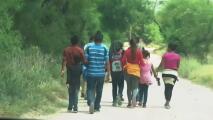"We all want to leave": how a government propaganda effort sought to curtail the latest caravan
The latest mass 'caravan' of Honduran migrants - the third in less than a year - set off at night from a bus station in the northern city of San Pedro Sula on Monday evening. By Sunday, more than 3,000 of the migrants had already reached the border with Mexico, most headed for the United States, according to officials.
But, in truth the caravan began months earlier with a Facebook poster convoking would-be migrants, with the slogan " Seeking Refuge, in Honduras we're getting killed." ( 'Buscamos Refugio. En Honduras nos matan')
It quickly swelled via social media chat groups.
However, on this occasion, unlike previous caravans, the effort to recruit migrants was met with a well-prepared barrage of government propaganda - by both the United States and Honduras - designed to choke the exodus, using the slogan # TuNorteEstáAquí. ('YourNorthIsHere')
Ads in recent weeks warned migrants about everything from the perils of the journey, including sexual abuse, as well as strict U.S. immigration laws. “Say no to irregular migration. The coyotes are playing with your life. You won't be able to enter the United States,” announced one Honduran government ad.
"The risks of # illegal migration are serious. Don't waste your time and money on a trip destined to fail," the U.S. embassy's Twitter feed declared, promoting a video of acting ambassador, Heide Bronke, addressing migrants from the Honduran border with Guatemala.
"Thousands of Hondurans who participated in the [previous] caravan have already returned, sad to have made the decision (to migrate), Don't allow yourselves to be fooled," she says in the video.
Her tone reflected a more sympathetic approach by officials with this caravan, in contrast to the harsh language in the past which blamed the caravans on political agitators.
“We know that reality here is difficult for many people," she added. "That is why we have invested millions of dollars to help Hondurans improve their security, their education and economic opportunities. Your country needs you ... Your future, your 'north' is here.”
The inception of the latest caravan, its rapid progress across three countries, and imminent arrival at the U.S. border, marks the latest test in an increasingly coordinated international effort, led the Trump administration, to stem the migrant flow.
Mixed results
But, the government media campaign appears to have had mixed results. On the one hand it likely limited the size of the caravan, but on the other hand it failed to keep the migrants from pouring into Mexico, many unchecked.
By the latest official account, more than 3,000 people associated with the latest caravan have presented themselves at the border with Mexico in recent days. That's much smaller than 7,000 who joined the last caravan. A Honduran government task force said 907 people were prevented from leaving due to lack of proper documents, including 136 unaccompanied minors, and many more may have been persuaded by the government ad campaign. Another 179 agreed to voluntarily return, as of Sunday.
"While no government can prevent its citizens from leaving, they have stepped up their efforts to identify minors, criminals, traffickers and others at risk," said one diplomat formerly posted in the region.
But, the migrants keep coming and no amount of border control seems to be sufficient to hold them back.
"The fact that so many have managed to enter Mexico will stimulate more departures and caravans," said Victor Meza, a leading political analyst and director of the Honduras Documentation Center.

Humanitarian visas
The big test is how Mexican President Andres Manuel Lopez Obrador handles the latest influx of migrants. Despite a major mobilization of officials at the Mexico's southern border with Guatemala, and a new, more orderly procedure for registering refugee arrivals, hundreds of migrants reportedly broke their way into a federal port of entry in Ciudad Hidalgo before dawn on Friday.
Mexico is offering migrants a one-year humanitarian visa, which comes with a temporary work permit.
"The storm front on the horizon is if the migrants get something like a transit visa to stay legally in Mexico, it doesn’t say which direction they have to go when it expires," said Adam Isacson, with the Washington Office on Latin America (WOLA), a watchdog group based in the capital.
Critics say governments have not yet woken up yet to the need to address the everlasting root causes of migration: poverty, lack of education and decent-paying jobs, as well as drug trafficking and gang violence.
Poverty
"We have a very large structural problem of poverty, " said Carlos Hernández, executive director of the Association for a More Just Society (ASJ). "It's been a steady process of deterioration in recent years."
A 2016 census found that almost 61% of Hondurans live in poverty. A lack of promised government benefits and programs to encourage people to stay home, means the migrant caravans remain an attractive option for some people.
A crisis over the controversial re-election of President Juan Orlando Hernández, that exploded in violence in late 2017 lasting several months, did not help. "The political polarization had led to a rejection of the president, even a hatred towards him," said Hernández. "That stimulated the first caravan as an expression of nonconformity and an escape valve."
María Euceda Padilla, 30, from Sonaguera, Honduras, lined up near a new set of tarps covering the border bridge between Guatemala and Mexico on Friday morning with her three children, aged seven, 13 and 15.
“He [president Hernández] said that he’s given a better life to the people, but if that were the case, we would not have to leave," she said.
Relacionados
Was the election in Honduras stolen, or bought?
A single mother, Euceda said she was aiming to reach Houston, where she hoped to find work and being unable to find a job in Honduras despite applying at several clothing stores over the last year.
She saw a government announcement on TV about the dangers for children who migrate, but she said they were all crammed in the house of her brother, who works picking oranges, and life became unsustainable in Sonaguera.
“It’s always scary, but the situation that we’re living is scary as well,” she said. “ If there’s no development in our country, people are going to continue migrating.”
Security emphasis
For months the Trump administration has berated Central American heads of state for not doing more to dissuade their countrymen from migrating. In meetings, Vice President Mike Pence has urged the leaders of the so-called Northern Triangle nations, Honduras, Guatemala and El Salvador, to beef up border security and crack down on coyotes.
U.S. policy has focused most of its efforts, and money, on the drug problem in Honduras, while President Hernández trumpets his achievement in bringing down the country's murder rate.
But, both seem to ignore the underlying social issues. The U.S. government dramatically increased aid to the region in recent years, appropriating $2.1 billion since fiscal 2016. The largest share has gone to crime fighting. In 2016 and 2017, Honduras received nearly $204 million for violence prevention, anti-drug efforts, improvements to the justice sector and other security measures, according to the Washington Office on Latin America think tank.
By comparison, $112 million funded economic growth, rural and social development and food security.
At an event on Thursday night, Hernández lit a 'torch of peace' at the country's Olympic stadium and hailed the sacrifices of fallen police officers in "the huge battle against crime." He said that "little by little" advances were being made. "We are preparing for the final battle, we will not allow them to continue in those neighborhoods and colonies where criminals enter and leave and generate anxiety," he said.
Yet, a 2018 poll by a Honduran think tank, the Reflection, Research and Communication Team, found that among those who had a family member leave in the last four years, 83% said the reason was economic insecurity, compared with 11% who said it was violence.
"We all want to leave"
Central Americans have migrated north for decades.
But, while officials may be reluctant to admit it, mass migration appears to have become the new normal in Central America where desperate, unemployed families have discovered that moving by caravan en masse is a cheaper and more secure way to reach the border without paying unscrupulous coyotes.
What chances they have of getting into the United States remains a long shot, largely depending on the strength of an asylum claim.
“We have to recognize it, that you can't live here. There's no work, only the risk of violent death. And the government does nothing," said Juan Ramón Martínez, a respected former Honduran politician.
He penned an article in the newspaper, La Tribuna, last week, titled "We all want to leave." He put it down to a natural, and universal, urge to improve one's living conditions. "The bottom line is ... we all want a better life. The frustrating thing that besets the poor in Honduras is that the offers of a better life, are not enough. Here, there is no work and over there (in the United States) there's jobs available."
Coffee and jobs
Lack of jobs is one of the main complaints voiced by the migrants, as well as insecurity due to gang violence and drug traffickers. While President Hernandez can rightly claim that violence has fallen in recent years, it remains high. Recent weeks have seen a resurgence of killings, mostly attributed to settling of scores between drug gangs.
Making matters worse, the international price for coffee, Honduras' main export crop, has fallen 10% over the last 12 months. The International Coffee Organization (ICO) in December forecast a second surplus year of production in 2019 meaning continued downward pressure on prices over the next few months. (Central America and Mexico together produce about a fifth of the world’s arabica beans.)
The electoral crisis in Honduras has eased in recent months and an electoral reform is expected to be signed as soon as next week. But the crisis distracted government attention from fundamental issues of health and education, says Carlos Hernández, and the caravan has served as a wakeup call about the underlying social problems that have gone ignored.
Henry Arce, 30, from Choloma, Honduras, waited in line at Mexico's southern border for a humanitarian visa late Thursday, A white wristband on his arm indicated he had legally requested one of the new visas.
He was aiming to meet cousins in the Mexican city of Queretaro, instead of heading all the way to the United States. He had almost been dissuaded by the government reports in Honduras that the route through Mexico was dangerous. Eight years ago, he had tried to migrate and has returned from Veracruz after he saw criminal groups assaulting other migrants who were riding the train known as “La Bestia,” a common way for migrants to cross the country.
He said he had heard of eleven people from the October caravan who, according to their families, had made it to the United States.
So, he decided to leave his steady job as a bus fare collector, earning 1,200 lempiras ($50) a week. In the eight years working on local buses he estimated that someone had assaulted passengers with a gun dozens of times.
He didn't put much store by the government ad campaign to stay home.
“They just want to make people afraid, so that they don’t leave, and they don’t migrate," he said.



